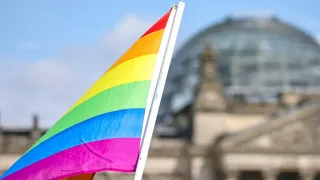May 22, 2024
2024 Cannes Dispatch 4: International Cinema Completes the Cannes Journey
Matthew Creith READ TIME: 5 MIN.
"On Becoming a Guinea Fowl" is a harsh look into one family's struggles but a 30,000-foot view of a cultural diversity unseen in American lives. Chardy is ultra-reserved as the badass Shula, never letting the audience forget where she stands on any subject matter as she proceeds through ridiculous animosity and shame. Director Rungano Nyoni ("I Am Not a Witch") utilizes Shula's dreams to illustrate her feelings towards certain family members in a realistic and often chaotic manner.
Women are still seen in this modern Zambian society as traditionally subservient, and even if Shula commands any room she's in, she still feels as though she must respect the men in her life. The titular guinea fowl is in reference to a children's television show that Shula can't get out of her mind, harkening back to a time when she felt the most secure in her body. The film is heartbreaking, at times deeply funny, and altogether horrendous in varying moments.
Finally, it was time to screen the new film, "Three Kilometers to the End of the World," co-written and directed by Emanuel Pârvu. Similar to "On Becoming a Guinea Fowl," this Romanian movie takes a horrifying situation and makes a commentary on the lack of cultural shifts occurring in a rural community. Rather than focusing on the difficulties of being a woman in a small town, this film expands into the life of a gay teenager struggling with shaming his family.
"Three Kilometers to the End of the World" stars Ciprian Chiujdea as Adi, a closeted gay 17-year-old spending the summer in the Danube Delta in his family's town that the Romanian Orthodox Church practically runs. A sensitive soul to his core, Adi is brutally attacked in an act of gaybashing that results in bruises and welts all over his face. Unable to hide what happened to him, his parents straddle the line of being more concerned with their son's sexuality being the talk of the town rather than the welfare of their own child.
The local police aren't much help either, as Adi is met with indifference towards his assault. Even the perpetrators openly admit to what they've done, knowing full well that religion and conservative values control the law around these parts. The summer season becomes an uncomfortable backdrop for Adi's pain, and as temperatures rise outside, growing fear of his sexuality rises inside his own home.
"Three Kilometers to the End of the World" is rough to watch but a much-needed reminder that even if we believe we've come far in respect for the gay community, there's still some more to go. In the United States, we have incidents like what happened to Matthew Shepard, a young man struck down in his prime largely because of his sexual orientation. But some people might forget that other countries, other towns, and other communities don't have hate crime legislation to fall back on. Some young gay people are still subjected to hate when all they strive for is love.
This film is a mishmash of tradition and cultural attitudes that meet modern expectations but remain mostly the same. Though we see glimmers of hope through Adi's bruises and want so much for him to flee this awful place in his life, it's clear that he's stuck for now with what God and his family have provided for him. Chiujdea will break your heart in a poignant performance that must be seen to be believed.







